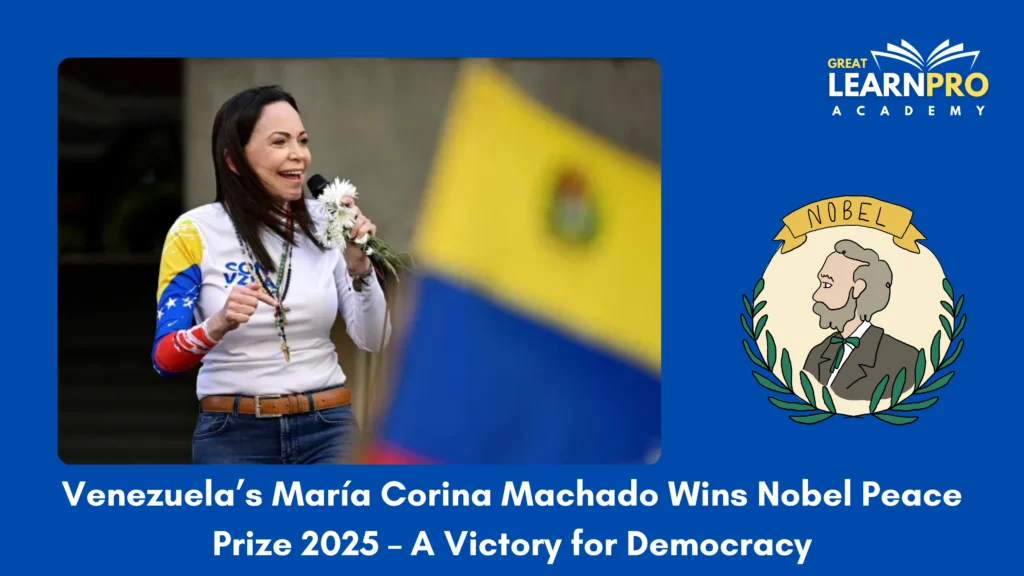On 10 October 2025, the Norwegian Nobel Committee awarded the Nobel Peace Prize to María Corina Machado, a Venezuelan opposition leader, “for her tireless work promoting democratic rights for the people of Venezuela and for her struggle to achieve a just and peaceful transition from dictatorship to democracy.” The announcement was made in Oslo, Norway, with wide international attention.

A Life in Resistance
María Corina Machado is no stranger to political confrontation. Since her rise in the Venezuelan opposition movement, she has become one of the most visible critics of the government of Nicolás Maduro. Machado has faced legal restrictions, personal threats, and political exclusion she was disqualified from running in the 2024 presidential election by Venezuelan courts.
Despite these pressures, Machado chose to remain within Venezuela rather than into exile, often operating in hiding under threat. Her decision to stay has been symbolic for many in Venezuela: a sign of resistance and hope. The Nobel Committee specifically commended that choice, pointing out how her staying in the country, despite serious threats, has inspired many.
Why the Prize Matters
The award is significant on several levels:
- Symbolic Recognition of Democratic Struggle
In a region marked by increasing authoritarianism, electoral manipulation, and political repression, Machado’s accolade stands as a strong message in favor of democratic principles. Her recognition serves as a reminder that internal resistance and civil society matter even when formal democratic institutions are under threat. - International Spotlight on Venezuelan Crisis
Venezuela has been beset by economic collapse, hyperinflation, migration crises, shortages of basic services, and human rights concerns. While these issues have long drawn international attention, the Nobel Peace Prize directs renewed focus to democracy rights and the political dimension of the country’s crisis. Machado’s win amplifies calls for international solidarity and support for democratic norms. - Recognition of Civilian Courage
It is notable that the Norwegian Nobel Committee’s citation refers to Machado as “one of the most extraordinary examples of civilian courage in Latin America in recent times.” The Nobel Peace Prize has often honored people who, in the face of danger, choose non‐violent resistance rather than flight or exile. Machado fits this lineage.
Responses and Controversies
As with many such awards that have global political implications, reactions have been mixed:
- Support and Praise: Many human rights organisations, democratic governments, and civil society activists welcomed the decision. For them, it underscores the importance of democratic processes and human rights in Venezuela, and gives moral support to those inside the country who continue to resist oppression.
- Criticism and Political Claims: The United States White House reacted critically, with a spokesman accusing the Nobel Committee of placing “politics over peace.” This came after high-profile figures—including Donald Trump had been nominated or suggested as possible laureates, often citing recent ceasefire efforts and peace agreements. Some critics argue that Machado’s recognition is also political in nature, given her opposition stance and the polarized view of Venezuelan politics internationally.
Broader Takeaways
The 2025 Nobel Peace Prize highlights several broader themes:
- Democracy under Pressure: Across the world, democratic institutions and processes are experiencing stress from both internal and external pressures. The Prize this year draws attention to how democratic rights can be eroded—not always through war, but through denial of political participation, suppression of dissent, and manipulation of legal systems.
- Importance of Civilian Leadership: Changes often come not from armed conflict but from sustained civic engagement, moral resilience, and political organising. The choice of Machado reflects this mode of struggle.
- Global Solidarity and Influence: Though the mechanisms of change are local, global recognition like the Nobel Prize can have an amplifying effect. It can put pressure on oppressive regimes, multiply the voice of opposition, and encourage diplomatic and human rights engagement from other nations and institutions.
Looking Ahead
The official Nobel Prize ceremony will take place in Oslo on 10 December 2025, where Machado will receive the monetary award (11.1 million Swedish kronor) and deliver remarks.
For Venezuela, the prize is unlikely to instantly shift the political balance, but it may strengthen opposition resolve, encourage greater international observation, and provide moral support to Venezuelans struggling for democratic rights. For the rest of the world, Machado’s win serves as a reminder that in places where institutions falter, one person’s courage grounded in non-violence can still stir hope and recognition.
Conclusion
In awarding the 2025 Nobel Peace Prize to María Corina Machado, the Norwegian Nobel Committee has emphasised democracy’s fragile nature, and the courage of those who defend it. Machado’s work is neither a finished battle nor an easy path; but her recognition globally sends an imperative: that peace, justice, and democracy are intertwined, and that the world should not turn away when one of its citizens stands for them under threat.
Sources:
- https://apnews.com/article/nobel-peace-prize-oslo-41b6bff88e2d57af0917bcf778e132a
- https://indianexpress.com/article/world/white-house-no-nobel-prize-trump-committe-politics-over-peace-10299313/?utm_
More Current affairs: https://learnproacademy.in/updates/
